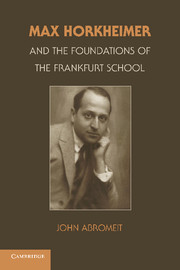Book contents
- Frontmatter
- Contents
- Acknowledgments
- A Note on References and Permissions
- Introduction
- 1 Coming of Age in Wilhelmine Germany
- 2 Student Years in Frankfurt
- 3 A Materialist Interpretation of the History of Modern Philosophy
- 4 The Beginnings of a Critical Theory of Contemporary Society
- 5 Horkheimer’s Integration of Psychoanalysis into His Theory of Contemporary Society
- 6 Horkheimer’s Concept of Materialism in the Early 1930s
- 7 The Anthropology of the Bourgeois Epoch
- 8 Reflections on Dialectical Logic in the Mid-1930s
- Excursus I The Theoretical Foundations of Horkheimer’s Split with Erich Fromm in the Late 1930s
- Excursus II Divergence, Estrangement, and Gradual Rapprochement
- 9 State Capitalism – The End of Horkheimer’s Early Critical Theory
- Epilogue
- Selected Bibliography
- Index
- References
3 - A Materialist Interpretation of the History of Modern Philosophy
Published online by Cambridge University Press: 05 June 2012
- Frontmatter
- Contents
- Acknowledgments
- A Note on References and Permissions
- Introduction
- 1 Coming of Age in Wilhelmine Germany
- 2 Student Years in Frankfurt
- 3 A Materialist Interpretation of the History of Modern Philosophy
- 4 The Beginnings of a Critical Theory of Contemporary Society
- 5 Horkheimer’s Integration of Psychoanalysis into His Theory of Contemporary Society
- 6 Horkheimer’s Concept of Materialism in the Early 1930s
- 7 The Anthropology of the Bourgeois Epoch
- 8 Reflections on Dialectical Logic in the Mid-1930s
- Excursus I The Theoretical Foundations of Horkheimer’s Split with Erich Fromm in the Late 1930s
- Excursus II Divergence, Estrangement, and Gradual Rapprochement
- 9 State Capitalism – The End of Horkheimer’s Early Critical Theory
- Epilogue
- Selected Bibliography
- Index
- References
Summary
Having examined Horkheimer’s childhood, youth, and student years in the first two chapters, we turn now in the following three chapters to the development of his Critical Theory in the period 1925–31. In contrast to studies of Horkheimer’s work that begin with his assumption of the directorship of the Institute for Social Research in 1931, I would like to argue in the following three chapters that his Critical Theory took shape in the period following his break with Hans Cornelius in 1925. Although Horkheimer continued to test, refine, and develop his Critical Theory through his collaborative work at the Institute, its basic contours were already in place when he became the director in 1931. In contrast to arguments that maintain that Horkheimer’s Critical Theory remained beholden to the tradition of “consciousness philosophy,” a closer examination of his work during this time reveals that it developed precisely as a critique of consciousness philosophy along two interrelated yet distinct axes: one diachronic and historical, the other synchronic and social. In his move beyond the consciousness philosophy of both his philosophical mentor, Hans Cornelius, and almost the entirety of contemporary German academic philosophy, Horkheimer placed consciousness firmly within the larger objective and dynamic structures of history and society – without, however, eliminating the active role of subjective consciousness in reproducing and transforming these structures. This chapter examines how Horkheimer moved beyond consciousness philosophy along the diachronic, historical axis in his lectures and writings on the history of modern philosophy in the late 1920s. The following two chapters address the ways in which Horkheimer moved beyond consciousness philosophy along the synchronic, social axis: through an examination of his theory of contemporary society (Chapter four) and his integration of psychoanalysis into that theory (Chapter five).
Horkheimer’s break with consciousness philosophy and his turn toward history and society
Horkheimer’s dissertation and Habilitationsschrift marked the culmination of his exploration of the debates on neo-Kantianism and phenomenologythat dominated German academic philosophy in the mid-1920s. Although Horkheimer was skeptical of these debates from early on, he delayed explicitly developing his own position until he had completed his Habilitationsschrift in 1925, due to the tacit tactical truce he made with Cornelius. However, with the completion of his academic requirements and his attainment of the status of Privatdozent, Horkheimer no longer felt obliged to play the role of Cornelius’s disciple. He continued to teach with Cornelius until the latter retired in 1929, and relations between the two of them remained cordial until Cornelius’s death in 1948. Yet after 1925, Horkheimer was definitely ready to return to the incipient critique of consciousness philosophy he had begun to develop several years before. Evidence of this readiness can be found in a passage from Horkheimer’s philosophical diary from September 16, 1925, which is worth quoting at length because it so clearly illustrates this crucial juncture in Horkheimer’s intellectual development.
Immanence philosophy, any type of “world” view, which equates the “world” with phenomena of consciousness, with relations or functions of phenomena of consciousness, has to have the courage for solipsism…. Separately and privately our philosopher senses of course that he is not at all a world creator, but rather a simple human being in the world.
- Type
- Chapter
- Information
- Max Horkheimer and the Foundations of the Frankfurt School , pp. 85 - 140Publisher: Cambridge University PressPrint publication year: 2011



